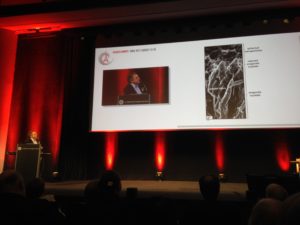
“That is wild! Nature made proteins that are ultra acidic” – How Corals Make Rocks
Good morning! This is my second Goldschmidt during my PhD and luckily I was able to join the EAG Blogging Team again (the first time was 2 years ago in Prague). Also very fortunate to have given my oral presentation of my research Monday morning. Thus I have non-stop enjoying all the talks and posters these past few days and before I knew it it was Day 3!
Yesterday for me was a super exciting day, not only were there some particularly amazing talks (like the first Robert Berner Lecture), but we had the pleasure of listening to the plenary talk “How Corals Make Rocks” by Paul Falkowski, who is actually a biological oceanographer. A professor at the Departments of Earth and Planetary Sciences and Marine and Coastal Sciences at Rutgers University in NJ, USA, part of Dr. Falkowski’s research focuses on origins of life and biogeochemical cycles.
Having studied corals during his PhD at University of British Columbia, it is only more recently that Paul and his team decided to look into how corals actually precipitate carbonates. They were able to make a coral cell culture, observe how aragonite grows on a surface in segments made up of crystallites (rather than one crystal), and study Coral Acid-Rich Proteins (CARPs), which are the nucleating agents for CaCO3 precipitation and have a pH ~4.
Now these CARPs are of special interest and as Dr. Falkowski nicely put it while describing some experiments with these proteins, ” Aha, I’m going to make [a nematode] precipitate apatite…the worm is pooping…the worm is pooping apatite…which is very cool.” Their studies have observed how these proteins are very resilient, evolving independently from metazoans and can function in a lower pH conditions than the current surface ocean pH. This is of significant implications as it suggests that stony corals will be continue to form carbonates despite the predicted change in ocean pH (Von Euw et al, Science 2017).
What I particularly liked about this talk was the biological approach to geochemistry. Plus it is yet another example that research from different perspectives is necessary and how interdisciplinary all our scientific work really is.
